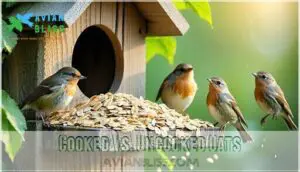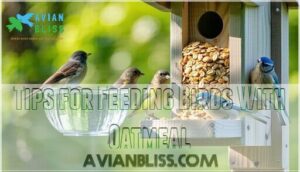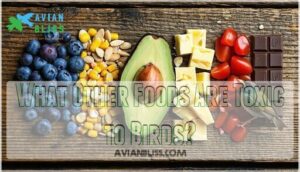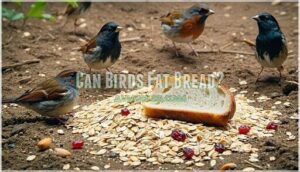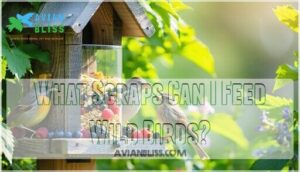This site is supported by our readers. We may earn a commission, at no cost to you, if you purchase through links.
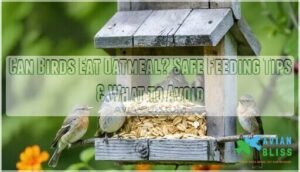
They can, but it’s essential to feed them uncooked porridge oats.
Cooking oatmeal can cause it to dry and cake around a bird’s beak, which is dangerous.
Rolled naked oats are a better, more affordable option.
When you feed birds oatmeal, make sure it’s safe and healthy for them.
You’ll want to know what other foods to avoid feeding birds, and what tips will help you create a bird-friendly garden – and that’s just the beginning of creating a welcoming space for your feathered friends.
Table Of Contents
- Key Takeaways
- What Can Birds Eat?
- Are Oats Safe for Birds?
- Can Birds Eat Oatmeal?
- What Other Foods Are Toxic to Birds?
- Can Birds Eat Bread?
- What Scraps Can I Feed Wild Birds?
- How to Attract Birds to a Garden
- What is The Best Food for Wild Birds?
- Frequently Asked Questions (FAQs)
- Are oats good for birds?
- Can birds eat cooked oatmeal?
- Can birds eat rolled oats?
- Can blackbirds eat oats?
- Can birds eat instant oats?
- Can birds eat oats in cold weather?
- Will birds eat uncooked oatmeal?
- How do I prepare oats for birds?
- Can squirrels and birds eat oats?
- How often should birds eat oatmeal daily?
- Conclusion
Key Takeaways
- You’ll want to feed birds uncooked porridge oats, as they’re a nutritious and healthy snack option – just make sure to serve them plain and dry.
- When offering oats to birds, you should avoid mixing them with toxic foods like avocado, chocolate, or milk, which can harm your feathered friends.
- To create a bird-friendly garden, you can scatter uncooked oats on the ground or place them in a bird feeder, and don’t forget to add a water feature and native plants that provide food and shelter.
- You shouldn’t feed birds oatmeal daily, but rather in moderation, and you can mix it with other foods like seeds, fruits, and nuts to provide a balanced diet and attract various species to your garden.
What Can Birds Eat?
You can offer birds a variety of foods, including fruits, cooked rice, potatoes, and plain porridge oats.
Offer birds fruits, rice, potatoes, and oats for a nutritious diet
It’s important to choose safe options that give birds the nutrients they need without causing harm.
Fruits
Ever wonder which fruits make the Safe Fruit List for your feathered friends?
Offer birds blueberries, grapes, or mashed bananas for exceptional Fruit Nutritional Value.
Chop or mash fruit into small pieces—easy for birds to eat and digest. Stick to modest Fruit Serving Size, and always avoid Toxic Fruits.
These bird feeding tips boost bird diet and overall bird nutrition.
Cooked Rice
After fruits, cooked rice is another safe bird food you can offer.
Birds love picking up small grains, and rice nutrition gives them a quick energy boost.
For the best rice preparation, rinse it well before cooking to remove extra starch. Skip the salt, butter, or spices—plain is safest.
Let it cool to room temperature so it doesn’t clump or burn their beaks. You can use any rice varieties, but always serve in small feeding amounts.
It’s a simple, healthy addition to any bird diet.
Potatoes
Switching gears from cooked rice, potatoes are another safe bird food if you prepare them right.
Here’s what you need to know:
- Choose plain, unsalted potato varieties.
- Roasted sweet potatoes offer extra vitamins.
- Skip green potatoes due to potato toxicity.
- Cut cooked potatoes into small pieces for easy eating.
Potato nutrition boosts birds’ energy, making them a healthy treat.
Porridge Oats
One simple way to help birds is by scattering raw porridge oats on your lawn.
Jays love oat groats, sparrows go for rolled oats, and doves prefer quick oats.
Oatmeal benefits birds by giving them energy, protein, and fiber.
Just remember, cooked oats can be dangerous, especially for baby birds.
- Raw Porridge Oats are best for most species
- Cooked Oats Danger: avoid sticky messes
- Safe Preparation Tips: always serve plain and dry
Are Oats Safe for Birds?
You might wonder if oats are safe for birds, and the answer is yes, as long as they’re plain, dry, and uncooked.
Birds can enjoy oats as a healthy snack, but you should always serve them in moderation to keep your feathered friends happy and healthy.
Oatmeal Safety
You might be tempted to toss out a handful of oats along with the apples and rice, but there are a few things to keep in mind for bird food safety. Oatmeal for birds can be a healthy treat, but stick to uncooked oatmeal—birds handle it better, and you avoid Cooking Hazards like sticky beaks or digestive blockages.
Is oatmeal safe? Yes, if you skip the flavored or sugary varieties. Additives to Avoid include salt, sugar, and preservatives that can harm your feathered friends.
Safe Preparation means using plain oats, served dry, in small portions. Oatmeal’s nutritional value helps birds with tissue repair and feather maintenance.
Keep Serving Size modest, and always place water nearby for easy sipping. With these tips, uncooked oatmeal birds enjoy stays both safe and nutritious.
Oats for Fledglings
In the case of baby birds, a pinch of oatmeal goes a long way.
Fledglings need high protein for growth, so oatmeal for birds should only be a tiny part of their diet.
Keep these tips in mind:
- Watch Oatmeal Size and Softness Preference
- Limit Feeding Frequency to avoid digestion issues
- Never offer cooked oatmeal, which can cause choking hazards
Stick to uncooked oatmeal in moderation.
Can Birds Eat Oatmeal?
You can safely feed birds oatmeal as long as it’s plain, dry, and uncooked.
Birds enjoy the small size and nutrition of oats, but remember to offer only a little at a time.
Cooked Vs. Uncooked Oats
Now that you know oats are safe, let’s talk about cooked vs. uncooked.
Birds eat oatmeal best when it’s raw—cooked oats can stick to their beaks like glue, causing real Cooking Dangers.
Uncooked oats offer better digestibility and keep the texture just right for most Bird Species.
You’ll also avoid Nutritional Changes that come with cooking.
Stick to uncooked oats for happy, healthy birds.
Providing safe foods for birds is essential for their well-being.
Tips for Feeding Birds With Oatmeal
Let’s build on the debate about cooked oats versus uncooked oats and see how you can make bird feeding both easy and rewarding. Birds eat oatmeal best when it’s served plain—just uncooked oats.
For more variety, create a treat by mixing foods such as oats, seeds, raisins, and peanuts (hold the salt). Mix uncooked oats with suet recipes for a high-energy snack, pressing this mix into mesh bags or pinecones for a fun twist.
Always keep serving size small and fresh, and prevent mold by removing leftovers daily. Provide easy water access nearby, especially when offering oatmeal for birds.
Uncooked oats are a popular choice for feeding wild birds.
- Mix oatmeal with birdseed for variety
- Scatter oats on a table or lawn
- Craft homemade suet balls
- Clean feeders to prevent mold
- Offer oatmeal year-round, increase in winter
What Other Foods Are Toxic to Birds?
You might think birds can eat anything, but some common foods can actually harm them. Knowing which treats to skip keeps your feathered friends safe and healthy.
Avocado
After learning that birds eat oatmeal for bird health, let’s talk about avocados.
Even though they’re tasty to us, Avocado Toxicity is a real threat to birds. Skip this fruit—its qualities can make birds sick fast.
For safe alternatives, stick with berries or apples. Choose proper Preparation Methods and follow Feeding Guidelines to support bird nutrition and keep backyard friends healthy.
Persin in avocados can cause heart failure.
Fruit Pits or Seeds
After learning about avocado risks, let’s tackle fruit pits and seeds. Not all bird food is created equal—pits from cherries, plums, peaches, apricots, and nectarines are a recipe for trouble.
These hard centers bring Seed Toxicity, air blockage, and damage your bird’s insides. Always remove pits and large seeds before serving fruits.
Go for safe seeds like apple or watermelon, but stay alert and research each type. For best bird safety and nutrition:
- Chop fruit into small, easy pieces
- Avoid cooked oatmeal with added seeds
- Offer variety, but prepare with care
Chocolate
Offering chocolate to birds might seem like an act of kindness, but it’s actually quite risky.
Bird chocolate toxicity is real—cacao effects on birds are serious because chocolate contains theobromine and caffeine.
Even a small nibble of chocolate can trigger seizures or heart problems.
Forget old chocolate myths; chocolate isn’t a harmless treat for your feathered friends.
Instead, reach for safe alternatives like berries, oatmeal, or mealworms.
If you’re bird feeding this season, stick to real bird food for safety.
Remember, every tiny visitor deserves a healthy snack and a dose of bird safety in the backyard.
Milk
When considering bird food, beware of milk due to lactose intolerance.
- Milk causes digestive upset
- Lactose is hard to digest
- Milk leads to diarrhea
- Fruits and veggies are healthier
- Seeds and water are alternatives.
Milk digestion issues make it a poor choice for birds, so opt for alternatives like water or oatmeal to keep them safe and healthy.
Can Birds Eat Bread?
When feeding birds, you’ll want to skip the bread.
It has minimal nutritional value, offering little protein, fat, or fiber.
Instead, scatter uncooked oats mixed with seeds and dried fruits to attract ground-feeding birds like sparrows and robins.
Oatmeal provides essential vitamins, minerals, and protein.
Bread can expand in a bird’s stomach, leaving little room for nutritious foods.
Opt for oatmeal as a healthier alternative.
Uncooked oats are a better choice than cooked oats, and they can be mixed with other foods for added nutrition.
This simple switch can make a big difference in the health of your feathered friends.
What Scraps Can I Feed Wild Birds?
You’re wondering what scraps you can feed wild birds, and it’s great that you’re thinking about their nutrition.
When feeding wild birds, you can offer them suitable scraps like oats, fruits, and vegetables, but it’s vital that you avoid raw meat and other toxic foods, which is crucial for their well-being.
Suitable Scraps for Birds
You can offer birds safe kitchen scraps like:
- Mashed fruits
- Leftover grains
- Garden waste
These scraps, including uncooked oats, provide nutrition for birds, and using them in bird food recipes can be beneficial, as birds eat oatmeal safely when it’s uncooked.
Supplemental feeding increases bird survival rates through added nutrition, which is a key factor in bird survival.
Avoiding Raw Meat
When feeding wild birds, you’ll want to skip raw meat to avoid Raw Meat Dangers like bacterial contamination.
Instead, try cooked chicken or boiled eggs as Safe Protein Alternatives. This reduces the risk of Bird Predation Concerns and supports Ethical Feeding Practices, keeping them safe while they eat oatmeal or uncooked oats.
You can even find pre-prepared chicken options for them.
How to Attract Birds to a Garden
You want to attract birds to your garden, right? Try these tips:
- Place oatmeal in a bird feeder or on the ground.
- Add a water feature with fresh water.
- Plant native plants that provide food and shelter.
- Avoid pesticides that harm birds.
By creating a welcoming garden design with shelter options and native plants, you’ll attract backyard birds.
Consider adding seed-bearing plants to offer natural food sources.
Remember, birds eat oatmeal, so consider its placement.
Use bird attractants like bird feeders and wild bird food to make your garden a haven.
This will bring joy and beauty to your outdoor space.
What is The Best Food for Wild Birds?
Wild birds thrive on diverse Natural Bird Diets that mirror what they’d find in nature. The best wild bird food combines high-quality seeds, nuts, and seasonal options.
Black oil sunflower seeds top the list—they’re packed with fat and protein that backyard birds love. Seed Variety matters too. Nyjer seeds attract finches, while millet draws sparrows and juncos.
Don’t overlook what birds eat naturally. Insect Consumption provides essential protein, especially during breeding season. You can supplement with dried mealworms. Berry Benefits include antioxidants and natural sugars—offer dried cranberries or fresh fruit.
Nut Nutrition supports energy needs, so unsalted peanuts work well. Seasonal feeding makes a difference. Spring and fall migration periods call for high-calorie options like suet.
Winter feeding wild birds requires fatty foods to maintain body heat. Summer brings fresh opportunities with fruits and nectar for hummingbirds. Consider purchasing sunflower seed products to enhance your bird feeding efforts.
The secret? Mix different foods to attract various species year-round.
Frequently Asked Questions (FAQs)
Are oats good for birds?
You’ll be delighted to know that oats are a nutritious treat for birds, providing essential carbohydrates, fiber, and proteins for their overall health and well-being, in moderation, of course.
Can birds eat cooked oatmeal?
Skip the cooked oatmeal for your feathered friends.
Once you heat it up, it can clump and harden around a bird’s beak, causing trouble.
Stick with raw, plain oats—birds will thank you with cheerful songs.
Can birds eat rolled oats?
You can feed birds rolled oats, just keep them raw and plain.
Birds peck at those little flakes with no trouble.
Rolled oats give them energy and nutrients, so your backyard feathered pals will be grateful.
Can blackbirds eat oats?
Blackbirds can enjoy oats, especially when you mix them with fruit for extra flavor.
Just remember, raw, plain oats work best.
If oats are sticky or cooked, they may gum up their beaks and cause trouble, so it is crucial to use raw oats to avoid this issue.
Can birds eat instant oats?
Don’t worry, instant oats sound easy, but they’re not the best for birds.
They often have added sugars or flavors birds don’t need.
Stick to plain, uncooked oats—your feathered friends will be healthier and happier.
Can birds eat oats in cold weather?
In cold weather, birds see oats as a powerhouse snack.
The carbs give them quick energy to stay warm.
Just remember, offer plain, uncooked oats and a bit of fresh water nearby to help them digest.
Will birds eat uncooked oatmeal?
Like scattered breadcrumbs for hungry souls, uncooked oatmeal becomes a winter feast that birds keenly devour.
You’ll find most species prefer raw oats over cooked versions, which can dangerously stick to their beaks and harden.
How do I prepare oats for birds?
Use raw, uncooked oats only.
Serve plain rolled oats, steel-cut oats, or pinhead oats dry in feeders or scattered on ground.
Never cook them—they’ll stick to beaks and cause problems, specifically with beaks.
Can squirrels and birds eat oats?
You watch squirrels and birds gather, wondering if oats are safe for them; yes, they can eat oats, a nutritious and healthy snack option for both species.
How often should birds eat oatmeal daily?
You should feed birds oatmeal in moderation, not daily, as it shouldn’t be a staple in their diet, to guarantee a balanced nutrient intake and prevent health issues.
Conclusion
Now that you know the answer to "can birds eat oatmeal", you’ll feed them safely.
Remember, uncooked porridge oats are best. You’ve learned what to avoid, like avocado and chocolate, and how to create a bird-friendly garden.
So, go ahead, offer oats, and enjoy watching your feathered friends thrive, knowing you’re providing a healthy snack when you ask, can birds eat oatmeal.
- https://www.birdfy.com/blogs/blogs/how-do-i-prepare-oats-for-birds-a-detailed-guide?srsltid=AfmBOopry24P5n1wwLY-psDK1MdALQnBF_AAHc0N5HhB9LCjs46x8Gg4
- https://parrotessentials.co.uk/blog/can-parrots-eat-oats-everything-you-need-to-know
- https://www.quora.com/Can-I-feed-my-canary-cooked-oatmeal
- https://www.vinehousefarm.co.uk/rolled-naked-oats
- https://www.facebook.com/groups/backyardbirdlovers/posts/1407710017328414/


